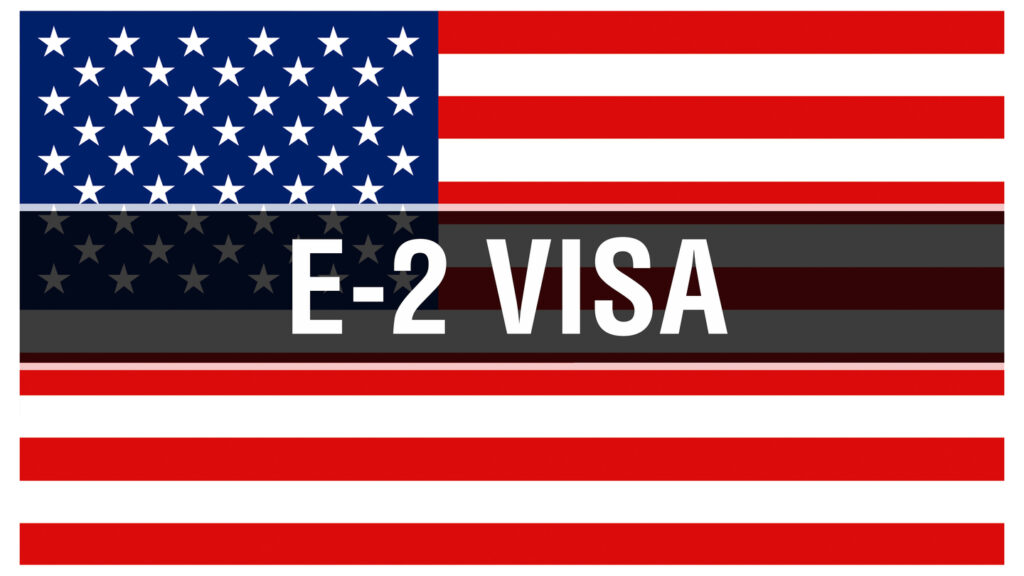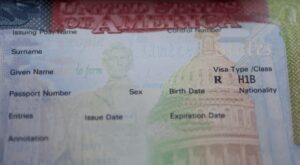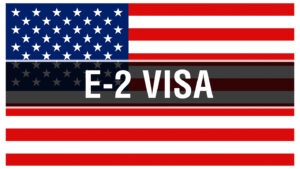E2 Visa Guide: Securing Your Family’s Future in the USA
Planning to invest in a US business? The E2 Visa might be your ticket to entrepreneurial success. This post unpacks everything you need about E2 Visas, from eligibility and investment to the application process and life after approval. We’ll cover the basics and address common questions.
One common misconception is that the E2 Visa is easy to obtain. Securing an E2 Visa requires planning and complying with U.S. regulations for treaty investors, as detailed on the USCIS website. This guide will clarify common misunderstandings and provide tips for a successful E2 Visa application.
Table Of Contents:
Understanding the E2 Visa
The E2 Visa is a non-immigrant visa. It allows citizens of treaty countries to invest in and manage a business in the United States. A “treaty country” has a treaty of commerce and navigation with the US.
Currently, there are over 80 E2 treaty countries.
Who Is Eligible for the E2 Visa?
E2 Visa eligibility depends on several factors. You must be a national of a treaty country and make a “substantial” investment, although there’s no set minimum. The business must be real, operational, and able to generate more than just a living wage for you and show clear E2 Visa criteria have been followed as an investor.
Your role must involve developing and directing the business as part of the E2 visa criteria and showing why you must reside in the U.S. for business growth reasons after fulfilling all the business documentation needed after initially obtaining E2 immigration entry via an established treaty of trade. Ensure you meet E2 visa eligibility and your investment capital is legally sourced.
Types of E2 Visas
- E-2 Treaty Investor: For substantial capital investments in a U.S. business.
- E-2 Employee: For essential employees of an E-2 investor sharing the same nationality, meaning E2 visa eligibility is extended to employees if an E-2 investor sponsors them.
Navigating the E2 Visa Requirements
Before applying for your E2 business investment Visa, review all the E2 visa requirements, including your treaty country’s specific eligibility under E2 visa qualifications. Understand the meaning of an E2 visa, what an E2 visa program offers, the nuances of the process, and whether it is suitable for your immigration journey since other options might better align with the meaning of E2 visas for your business type and personal intentions for stays and how “dual intent” may affect future Green Card aspirations given the requirements of intent behind an investor business E2 program where stays and “dual intent” play a critical role for your current and future E2 Visa status.
Nationality Requirement
You must be a citizen of a designated E2 treaty country for E2 visa eligibility. This is a fundamental E2 Visa requirement.
Investment Requirement
The “substantial” investment requirement is relative to the business’s total cost for an E2 Business visa. A small business generally requires a proportionally higher investment for approval for a U.S. E2 business and being sure the E2 visa investment percentage meets requirements.
Business Requirement
The E2 business must be legitimate and demonstrate growth potential beyond providing just a living wage. You’ll need to provide legitimate proof of funds, showcasing a legal source of income used for your E2 business.
Your role within the company’s management and development will be reviewed. Show that the funding sources are sufficient for not just survival but significant growth.
Management Requirement
You must demonstrate active involvement in the E2 business’s development and direction as an E2 Visa applicant and understand the implications of applying for E2 status while on another non-immigrant status or whether this applies in any dual intent scenarios.
The E2 Visa Application Process
The E2 Visa application process can take several months and varies based on whether you are applying for an E2 work visa as a manager or from inside or outside the US, given the E2 visa type selected, your current E2 visa status, whether a nonimmigrant investor visa or another nonimmigrant visa. This applies both when applying for a business E2 visa initially or an extension later after approval.
Applying from Within the US (Change of Status)
File Form I-129 (Petition for a Nonimmigrant Worker) with USCIS. Gather E2 visa applications and E2 business documents supporting the E2 visa application, including all details of the financial status of the planned venture.
Applying from Outside the US (Consular Processing)
Begin by completing Form DS-160 (Online Nonimmigrant Visa Application). Attend a visa interview at a U.S. embassy or consulate, showing you fulfill all E2 visa criteria, including any employee sponsorship via a newly established E2 business and all E2 treaty investment documents needed, while addressing “dual intent” rules with E2 visas when seeking other nonimmigrant visas or future residency through Green Card means to stay as a longer-term resident, noting all relevant facts needed to make a clear case why it meets any intent questions by U.S. officials that could otherwise block you from nonimmigrant entry initially as an E2 treaty business investor or later during E2 visa status extension attempts as a resident under E2 status where E2 visa status regulations must be observed for ongoing extensions while on nonimmigrant entry using an established and verified trade treaty.
E2 Visa Costs: A Breakdown
Beyond investing in your E2 Business, there are E2 Visa application costs. These include the governmental filing fee and any attorney or translator fees for E2 visa applications, filings, and general help in E2 visa information needed to get it done quickly.
Don’t forget to consider expenses like obtaining certified document translations, which can vary by language.
Life After E2 Visa Approval
After E2 Visa approval, understand the regulations associated with your E2 business visa. Focus on developing and growing your US business. Comply with E2 Visa application rules when making changes to your work location under your approved business. Maintain your status for E2 visa renewals or extending business locations under E2 immigration guidelines while following any E2 visa regulations, along with “non-immigrant intent” statements related to the intent with regards to seeking or not seeking future U.S. residency via dual intent regulations, for cases when residency questions or scenarios are posed, and documentation of your responses and intentions must be clearly stated and tracked by U.S. officials reviewing business documentation for business E2 Visa related questions regarding initial investor approvals for non-immigrant entry into the United States.
Working in the U.S.
An approved E2 Visa authorizes you to work within your designated E2 Business as a non-immigrant. For those on an E2 immigration visa, your E2 Business work authorization must comply with USCIS work authorization guidelines. Ensure your employment authorization and immigration steps meet U.S. regulations for Green Card purposes.
Travel and Extensions of Stay for an E2 Immigration Visa
E2 immigration visas have specific travel and stay rules for nonimmigrant status. Initial stays are typically up to two years. Longer stays may be possible with renewals and appropriate immigration documentation, as stated on official information resources by U.S. officials.
An extension of stay might require re-applying outside the U.S.
E2 Visas and the Path to Permanent Residency
The E2 Visa doesn’t automatically lead to a Green Card. It’s not “dual intent,” unlike other E2 visa types for investor employees of established businesses where dual intent rules must be addressed upfront as part of your U.S. work status application filings in certain categories where dual intent regulations can be complicated. Explore options like employment-based Green Cards.
Be mindful of how a long-term non-immigrant E2 visa might affect Green Card efforts, like family sponsorship, due to “dual intent” issues with long-term immigration intents. Dual intent and any changes or renewals for visas of different types under other treaty agreements need careful evaluation with all related parties involved early on and having any forms ready for a timely, thorough submission along with a detailed accounting of how and where all investments were sourced along with how profits would grow over time.
FAQs about E2 Visas
Who is eligible for an E2 visa?
Citizens of an E2 treaty country who have made a substantial investment in a U.S. business and will actively manage it are generally eligible for E2 visas. E2 employees of E-2 businesses must share the same nationality as the E-2 treaty investor if sponsored for an E2 employee visa. The E2 investor generally needs at least 50% ownership and fulfills key executive roles. All investment income sources must be documented and legal.
What is an E2 US visa?
An E2 US visa is a non-immigrant visa enabling citizens of treaty countries to invest in and operate a U.S. business. The E2 visa is typically obtained via “consular processing.” Approval happens at consulates tied to your nationality and current E1 visa type or category.
Can an E2 visa lead to a green card?
The E2 visa has no direct path to a green card. Maintaining “non-immigrant intent” is essential due to dual intent regulations that need to be addressed. Pursuing a green card through your E2-sponsored US business is possible after meeting initial visa requirements, but “dual intent” issues need careful handling as this could make later immigration more difficult given how these applications could potentially conflict with your E2 visa status while you apply or your long-term resident immigration or Green Card status intentions. So maintain detailed accounting with proper document filings that answer dual intent rules while on an E2 Visa type under existing treaty agreements, explaining how your intentions relate to residency. Provide proof related to income growth with employees along with where all investment funding came from as requested under established laws regarding investor and business E2 immigration documentation. It must clearly show intent to fulfill all residency and compliance rules and show compliance, intent, and other dual intent considerations to successfully navigate dual intent regulations in compliance with applicable regulations. This allows for smoother future renewals, filings, or other needed immigration paperwork or documentation while residing within the U.S. under nonimmigrant entry.
How much investment is needed for an E2 visa?
The necessary investment amount for E2 visas should be “substantial.” There’s no fixed amount for investment approvals to a US-based E2 company since factors like existing franchise models may weigh differently than completely new ideas that require funding that isn’t readily visible due to novelty. Expect a substantial percentage of the entire funding needed to become fully operational. Higher E2 visa investment percentages are typical for novel service businesses or new product categories as opposed to known, franchise E2 businesses with proven histories and established markets and financial growth metrics.
Aim for an enterprise with a high potential for revenue and job creation rather than mere subsistence-level income. “Risk tolerance” plays a part in investment decisions and E2 filings, given how much financial risk is apparent from established E2 companies versus those with no business E2 immigration history, noting how proven models from prior franchise business may affect the amount required as part of immigration, since investment history may influence funding levels, risk tolerance evaluation by officials. It’s essential to address investment-related documentation in your business filings according to all relevant E2 Treaty rules and regulations to convey information to ensure prompt approval as part of all investor approvals under current and applicable laws. Also, maintain compliance for any investor or employment sponsorship filings after nonimmigrant E2 business entry or investor status updates.
Conclusion
The E2 Visa offers a valuable opportunity for entrepreneurs to invest in and manage businesses in the U.S. While navigating the application’s complexities may present challenges due to its numerous components, understanding its stipulations as part of a program like the E2 visa program and other options with an established and registered company will make the E2 Visa route very well be your gateway to establishing a lasting U.S. presence after completing E2 business investment or employment visas using approved trade treaties as a starting point.
The E2 Visa can unlock business potential in the U.S. It can create unique work status complexities when balanced with the complexities of permanent residency goals under U.S. immigration rules and how both intersect when attempting extensions under dual intent rules and immigration regulations to transition from nonimmigrant status into a U.S. permanent residency as per official guidelines related to visas for entrepreneurs in any of the 80 plus treaty country arrangements related to dual intent documentation filings in specific treaty agreement stipulations. Remember that non-immigration status under established agreements plays against long-term intentions for stays, as officials often question motives. They require documented, proven data demonstrating a clear financial need along with E2 employee and income information tied to the local area, business location, and investor capital needs along with verifiable income generation, financial growth metrics with projections, and other financial and business documents that showcase your intent with E2 immigration, growth and longevity. These metrics are important after any initial entry where intent could create future complexities under E2 regulations, treaties, and guidelines for individuals who initially apply for investor or employee Visas that seek U.S. residency while under other visa types like an I-9 Employment Eligibility Verification as per examples under dual intent regulations. Be sure all dual intent, investor intent, future business needs, and location needs, along with investor and employer income sources, are completely transparent when applying initially as an investor with an approved E2 treaty country.




